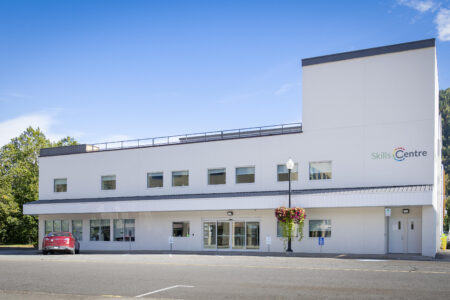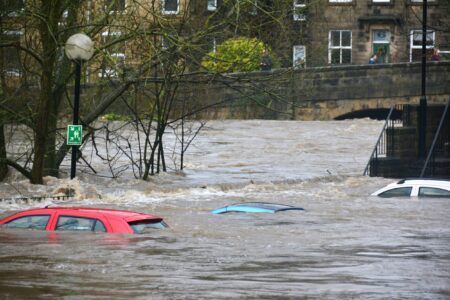City Hall Creates Enough Hot Air to Heat a Swimming Pool
When one thinks of a swimming pool, they don’t often see it as big user and burner of fossil fuels and contributing to C02 emissions. The Rossland pool however, in order to keep the water a comfortable swimming temperature currently heats the water with boilers burning natural gas.
Looking for a solution and a better way of doing things both environmentally and economically, Aaron Cosbey of the Rossland Pool Society began looking into alternative water heating methods.
“Well I have been searching around for a while, to figure out how to do alternative heating,” explained Cosbey. “I wanted the environmental benefits and I wanted the economical benefits that could come with it. I’ve been looking at different kinds of solar systems and our roof size is basically too small to give us much of a kick in terms of the solar heating potential. Peter Hillis, one of the other board members, said to me, “You know, what about those AC units on City Hall?” So I started checking into it and found a heating/cooling specialist in town that has been doing installations of this de-superheater technology and he said, ‘oh yeah, we can do that’ and we just took it from there.”
The technology is quite basic and ingeniously simple. Essentially, the 4 AC units on top of city hall that blow cool air into the building export volumes of hot air that was just being released into the atmosphere. The de-superheater technology, as described by Cosbey, traps that hot air and uses it to heat the water of the pool.
“City hall has got four big AC vents that are just pumping out the hot air all summer and we’re sitting right beside them burning gas to fire our boiler to heat the water all summer, so we figured that didn’t make any sense, so we’re going to pull all of the waste heat off of those air condition vents and pipe it as a pre-feed into the boiler and use that to heat out pool, thereby saving money on what is our biggest operating budget item and cutting out about twenty tons of C02 equivalent every year.”
Making this process possible is de-superheater technology, a product sourced out of the AC heavy use state of South Carolina.
“We’re just taking this off the shelf technology and sticking one of them on each of the vents. It’s basically a heat exchanger. It heats up the water, then we pipe that water over the city hall roof over to our boiler room and from there into the pool. There are a lot of control mechanisms in terms of stuff that gets in the way, but the basic system is what I just described,” explained Cosbey.
The system itself is not a cheap one, and Cosbey, along with the pool society, have been researching and looking into a number of potential funding options to find the money to install it. This past Monday evening Cosbey presented the pool society’s case to Rossland City Council looking for $33,000 in funding to come from the gas tax fund.
“The two major pokers in the fire at this point are we have a pending application to Van City Credit Union out of Vancouver who are interested in buying the carbon offsets that we create, so proposals are in to them for $10,000 of this funding. The proposal last night at council was for $33,000 with capital expense to come under the gas tax fund. The gas tax fund is a provincial fund set up by the government to rebate the gas tax to communities for infrastructure projects. This falls squarely into that mandate.”
While the upfront costs of installing the system are not cheap, the potential benefits in terms of reducing emissions from the pool’s operations as well as large financial savings that will allow the society to put significant funds back into the operation and programming of the pool itself that otherwise would have gone into gas costs seem to make the project a no-brainer.
Last year the pool society spent $6,000 on gas which was the biggest line item in their budget. Implementing the waste heat recovery system would not save all of that money as some gas heating would still be required when the AC is not pumping out enough heat. The society’s conservative estimate if that they will save approximately three quarters, or $4,000 to $5,000 per year, on heating costs.
“It is expensive,” noted Cosbey. “It’s going to cost us a little over $30,000 to put it in, but you figure that’s about a seven year payback under the most realistic projections that we can get, so that’s not a bad time frame. We’re trying to get the whole thing funded which would mean we have zero payback. You take that operating line item out of our budget and it allows us to do so much more in terms of programming each year. We are a non-profit operation so every penny saved goes back into community services. It allows us to do more programming, allows us to keep our fees low. So it’s a real social thing for Rossland as well.”
If they get the green light to go ahead with the project, they expect to have the system installed in late May in time for the pool’s opening in June.
“We’re looking forward to the day that we can sit around figuring out what to do with our spare revenue, who to give free programs to and all of that,” concluded Cosbey.
























